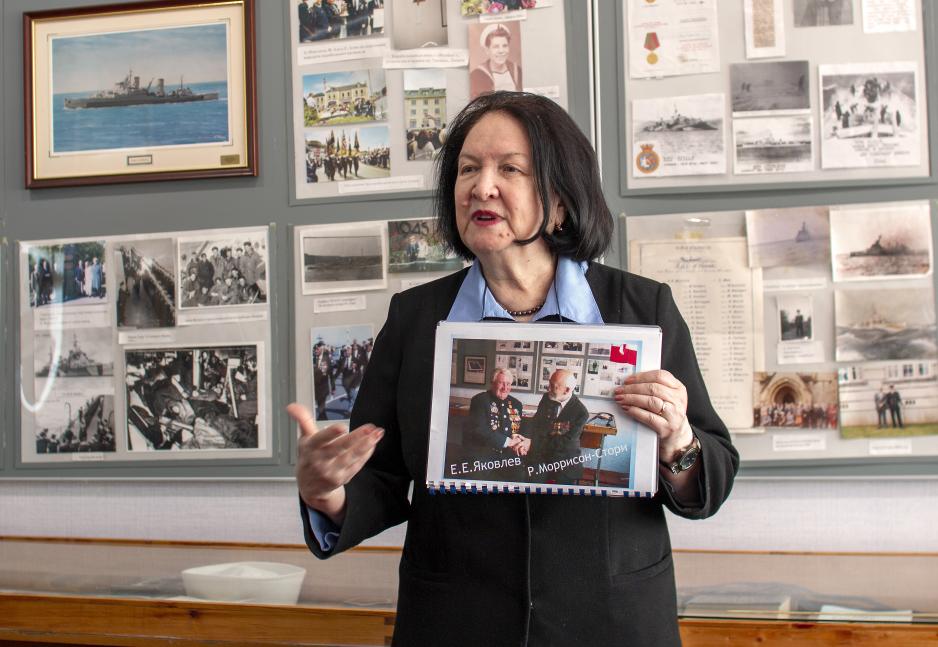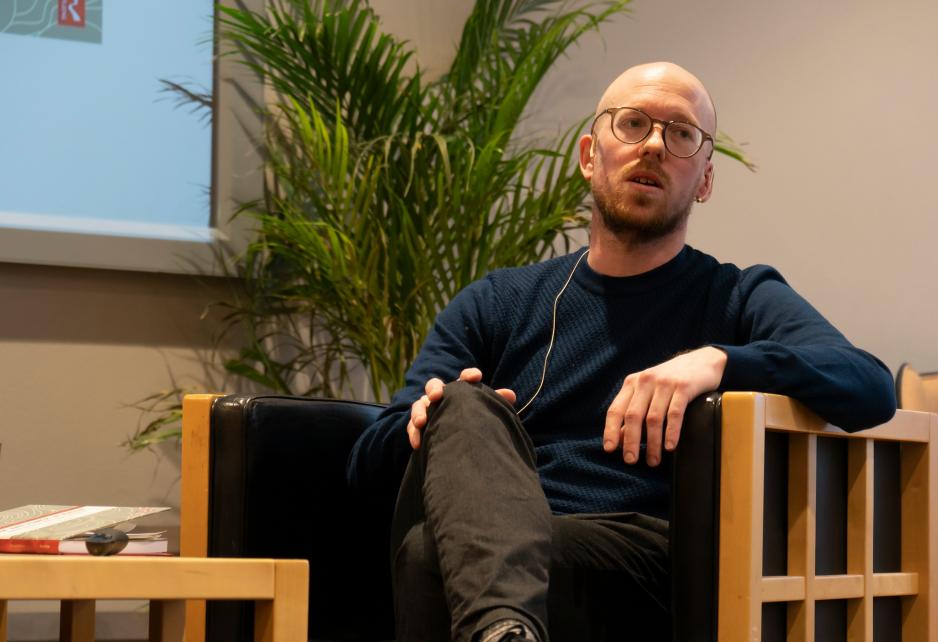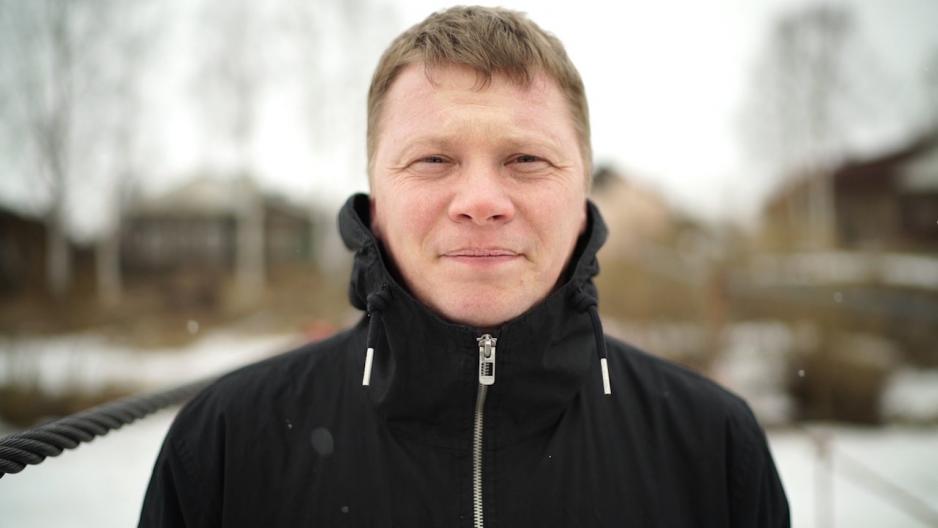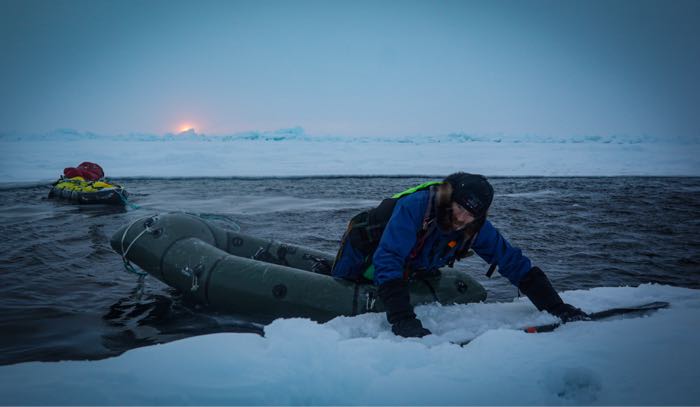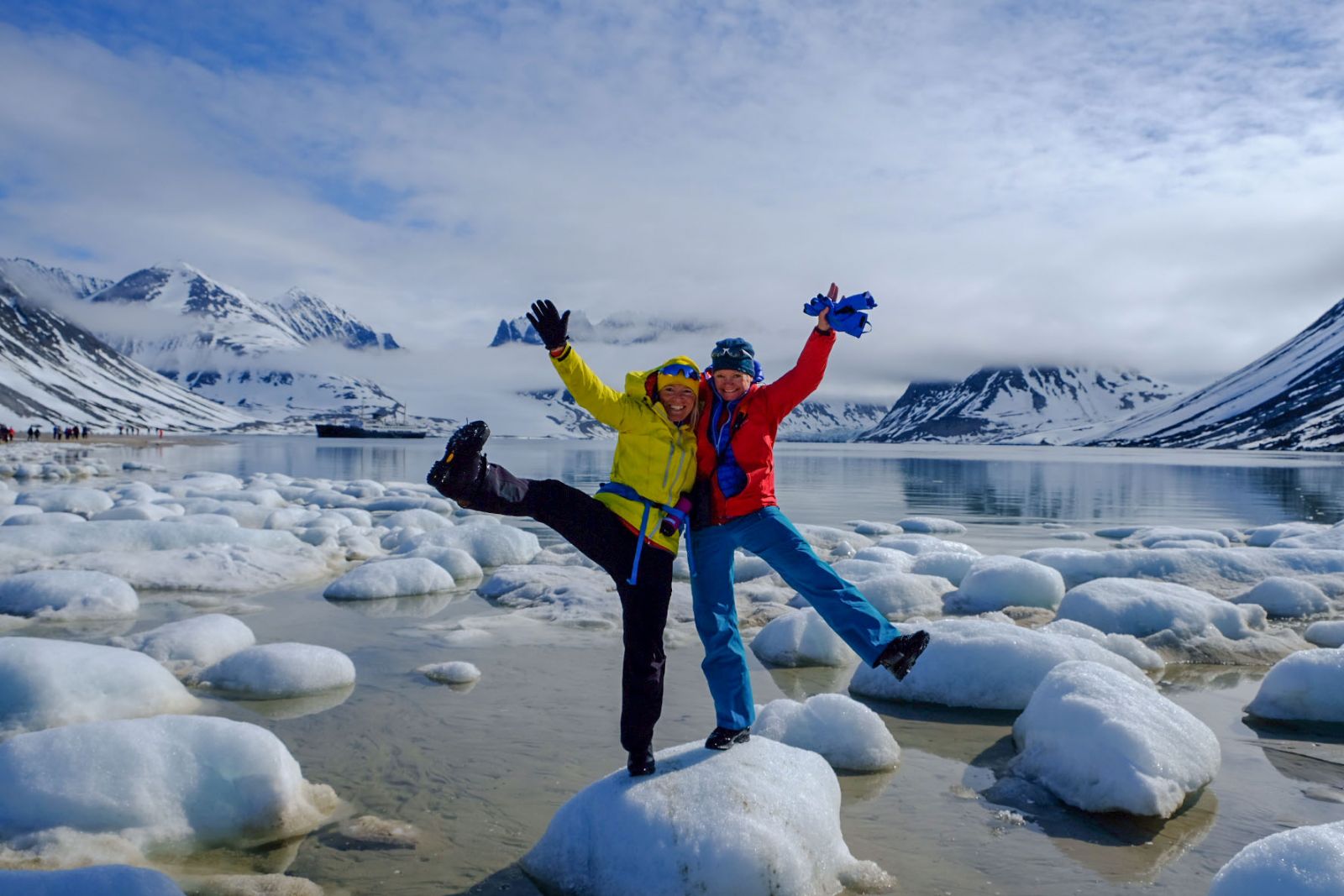Why War History is Increasingly Important for Russia
Through associating with the victors of WW2, the current authorities secure their legitimacy. War history has become an increasingly important tool for political stability, for the "patriotic raising" of young people, and as a joint idea for uniting the people.
MURMANSK: "History is very interesting for me. I will take an exam in history next year, says 14-year old Hanna Ayzizova.
We are at the war museum at Gymnasium number 9 in the Russian Arctic city of Murmansk. The room is not more than 20 square meters. The walls are packed with pictures, posters and paintings. Glass cases along the walls display various historic artefacts from the war; documents, books, ID cards, medals.
A handful of pupils have just presented war history from the Arctic to an audience consisting of Norwegian veterans, journalists and politicians – in fluent English. Much of the war history from Murmansk is about ship convoys and the Litsa front – the deadlocked front line between Kirkenes and Murmansk in which tens of thousands of Soviet and German soldiers fell.
Deputy Headmaster at the school, Natalia Galeyeva, says the museum was created in 1988 following war veterans from Great Britain visiting Murmansk in relation to Victory Day on 9 May.
“We discussed the difficulties of the war with British veterans over a cup of tea. After some time, we started collecting letters, photos, books and other information and eventually decided to open a museum at the school. We also started corresponding with the British veterans, Galeyeva says.
The museum is a voluntary after school activity for the pupils and is not included in regular teaching. The pupils themselves provide guiding for guests as well as other lectures on demand. Visitors are mainly other pupils, war veterans and foreign delegations, Galeyeva says.
Veterans who do not manage to get to the museum can have home visits from the pupils.
“We believe it is very important for young people to know the history of their country. And we are grateful for tall these people who gave their lives during the war. In reality, all Russian families suffered because of the war. This work to commemorate them is important, not just for our pupils, but also for our guests from home as well as abroad. Peace is life, and we must remember that, says Galeyeva.
The pupils at gymnasium number 9 who are involved in the school war museum are all above average interested in history. Some also take extra classes in history at school.
But like so many other Russian families, many of the pupils also have relatives who participated in WW2.
“My great grandfather was at sea during the war. History matters to me in more ways than one”, says Yegor Raptschesky (16).
We believe it is very important for young people to know the history of their country
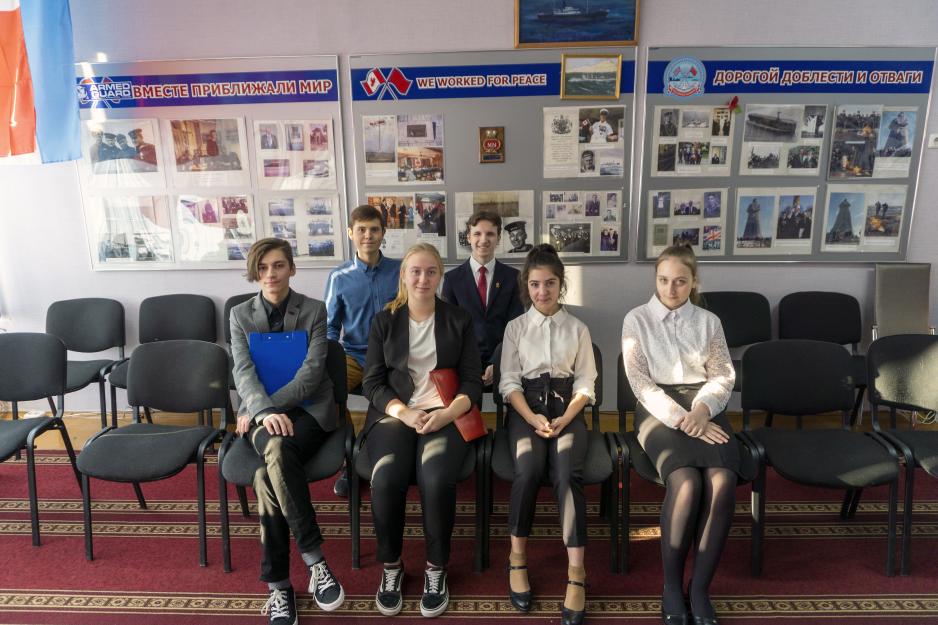
Pupils at gymnasium number 9 in Murmansk contribute actively at the school’s war museum. Front, from the left: Yegor Raptschesky (16), Sonya Prekapenko (16), Hanna Ayzizova (14), Katya Yegorova (14). Back: Nikolay Sheroky (17) and Dmitry Lakisa (14).
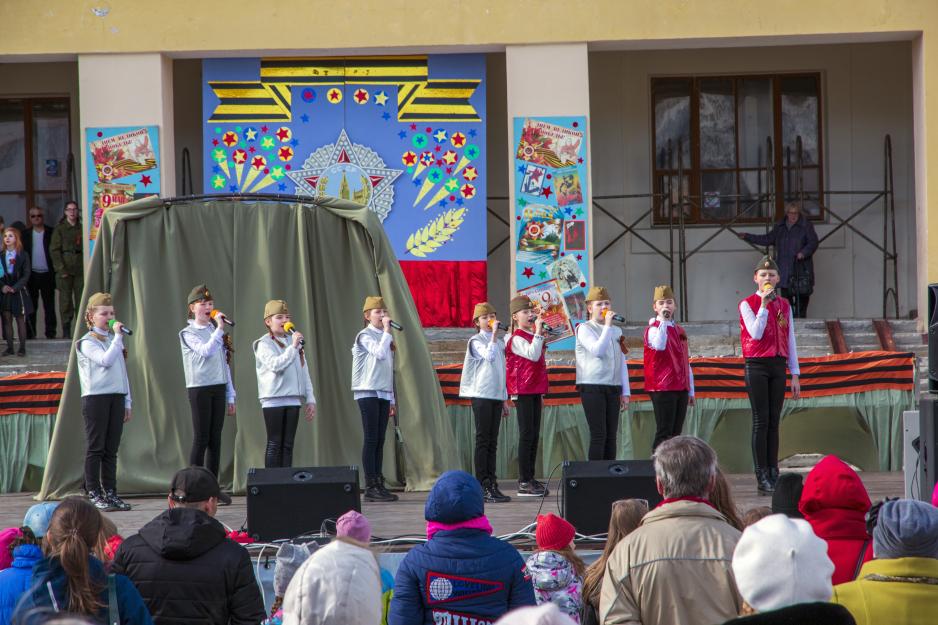
Young girls in time-appropriate headwear, the Soviet pilotka, which was used by soldiers from the Red Army during WW2, sing during the Victory Day celebration sin Nikel on 9 May this year.
The Heroic Story of the Golden Age
Children dressed in Soviet military uniforms and with copies of historic automatic weapons play before the Lenin statue in Nikel. The official 9 May march to commemorate the fallen of the Great Patriotic War is over. Now, the city’s authorities have invited to festivities before the Palace of Culture.
Both children and adults, dressed in time-appropriate clothes from the war sing Soviet military songs about heroism and victory. The scene is decorated with military green camouflage colors and the order of St. George – the disputed black and orange ribbon used amongst others by Russian separatists fighting in eastern Ukraine.
“President Vladimir Putin wants to use the war as a joint idea for the nation”, says Håvard Bækken, Senior Researcher at the Norwegian Institute for Defense Studies. He has, amongst others, studied the Russian “State Programs for Patriotic Fostering”.
“The official Russia needs an idea that unites the people. This is particularly important for an authoritarian regime that cannot be legitimized through democratic participation or economic redistribution in a convincing way”, says Bækken.
World War 2 is key here. Bækken refers to how authoritarian regimes often tend to promote heroic tales about their golden age. And WW2 was such a golden age for Russia, even though the war also was a disaster for the country.
“Today, Russia by and large reproduced the basic Soviet story about the war. The war is often referred to as ‘The Great Patriotic War’, the defense war against Nazi Germany that started in 1941. That is the most important take, because that allows for circumventing many of the aspects with the war that were problematic from a Soviet point of war, such as the Ribbentrop Pact, the Katyn massacre in 1940 as well as the deportation of entire peoples inside the Soviet Union, Bækken says.
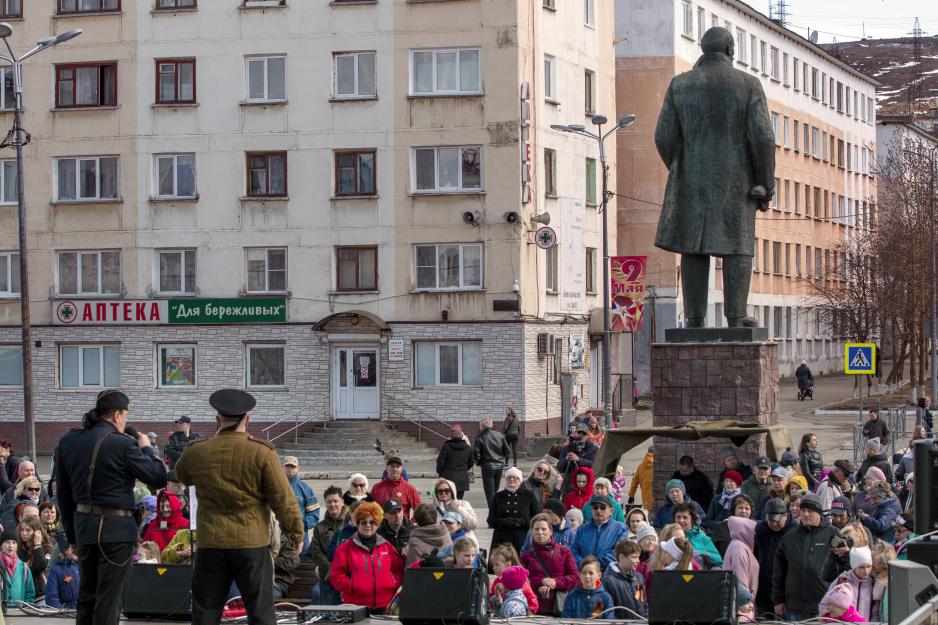
Nikel commemorating Victory Day on 9 May 2019. The city’s authorities invited to festivities.
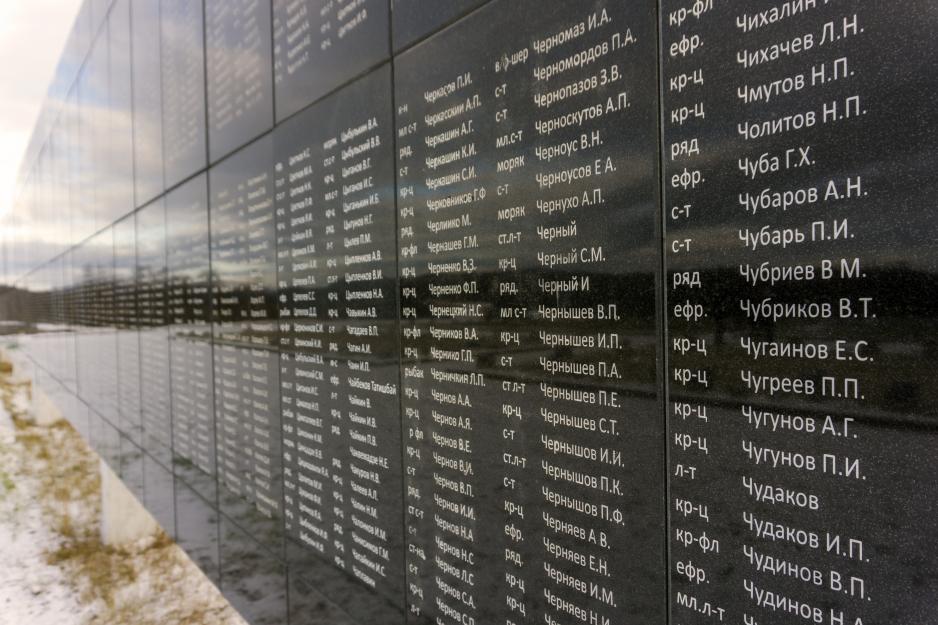
15,000 names are listed on the memorial plaque for fallen soldiers in the Litsa valley, halfway between Murmansk, Russia and Kirkenes, Norway.
During the Soviet era, this kind of commemorations were kept away from the youngest children. Today, however, this is widely introduced in Russian kindergartens.
Bækken argues that the room for nuances has been narrowed down when war history is told in the current Russia. Emphasis is placed on Soviet heroism and fellowship, on the different people groups inside the country fighting together to defend the Russian core. The referring to the war as “the Great Patriotic War” is also a conscious move.
“This is a repetition of the Patriotic War, i.e. the defense war against Napoleon. Just as there was a shady alliance policy between Stalin and Hitler prior to WW2, there was also that between Tsar Alexander 1 and Napoleon”, Bækken says.
War history has always been important in Soviet and later Russian history. But something has changed over the past few years.
In 2011, a commission against “falsification of history to the detriment of Russian interests” was created. The background for this was the way many countries of Eastern Europe rewrote war history from the Soviet version to focusing on the less heroic incidents, such as the partition of Poland between Hitler and Stalin, as well as the occupation of the Baltic states after the war.
The militarization of children has also increased in recent years. Children down to the ages of four to five years now walk around with replica guns and soldier uniforms from WW2 when Victory Day is celebrated.
“In the Soviet era, this kind of commemorations were kept away from the youngest children. Today, however, this is widely introduced in Russian kindergartens. Very often, the story about the war is the entry to introducing military issues to children. You cannot start military training directly; one has to go through war history.”
- So, this has a purpose that has to do with preparing some of the population for military service?
“Yes, this is a part of it. What happens now, just like in the 1970s, is that the militarization of everyday school life increases, while the number of years for mandatory military service is reduced. Thus, you need more military preparation training in school. Children are not only to learn how to handle weapons, they are also installed with this ‘basic attitude’,” says Bækken.
- Is this a willed policy?
“Yes, and one makes no secret of this. The state programs for patriotic fostering has a policy component and says something about what patriotic fostering is and why the state needs it. In that, it is implied that the heroic aspects of the war are to be celebrated. After that follows a concrete plan for how to allocate money to various initiatives. There is great focus on commemorating the war ‘correctly’.”
Through associating with the victors, the current regime secures its legitimacy
Standardized schoolbooks
Everyday praxis in schools and statements from politicians are two quite different things, says history teacher Mikhail Kopitsa from Arkhangelsk.
He says that even though the official war rhetoric about the war moves towards denial of the less heroic aspects of the Soviet Union’s actions during WW2, schools have by and large been sheltered from that.
“Statements from politicians and state propaganda shows us a clear turn towards denial the criminal character of the Molotov-Ribbentrop Pact and the suppression of facts about war crimes conducted by the Red Army. However, schoolbook texts and learning plans do not contain that as per today. They have a rather balanced approach, even though the events of the war and the victory are recognized as main events of the 20th century, Kopitsa says.
He argues that non-school organizations for children and youth have far larger possibilities for ideological manipulation.
- How important is WW2 for the current Russian authorities?
“It is crucial. Through associating with the victors, the current regime secures its legitimacy”, Kopitsa says.
Earlier, there was widespread pluralism and schools could choose books themselves. Now, however, this is more standardized, Bækken argues.
“Teaching books are a good source of what perspectives are brought on. It does not omit the fact that Stalin purged large parts of officers in the army, political management and other people, however, it has to do with how much emphasis that is placed on this. And the books consequently refer to the victims in passive form, whereas it does not mention who the perpetrators were. However, when Stalin does something positive, it is mentioned in active form. This is a kind of linguistic take that can subtly shape understandings of history,” says Bækken.
This article was originally published in Norwegian and has been translated by HNN's Elisabeth Bergquist.


